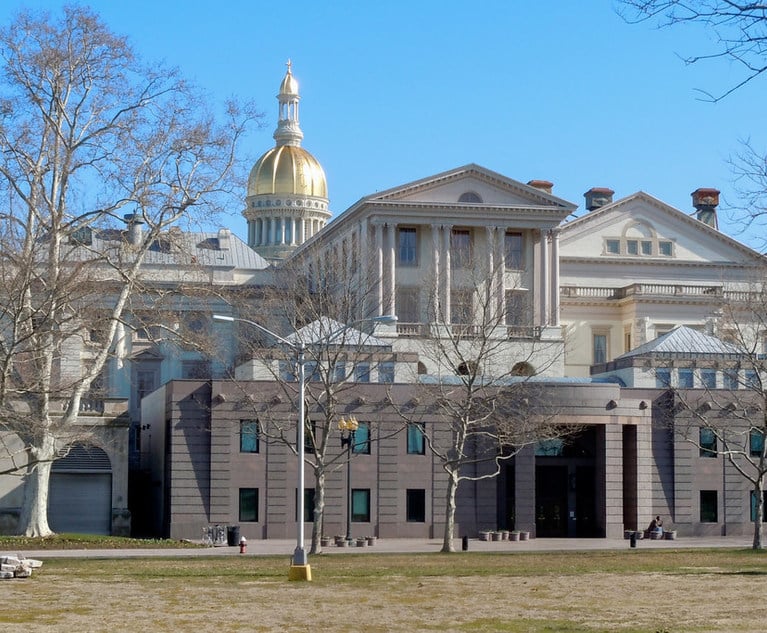 Assemblyman Craig J. Coughlin and Sen. Stephen M. Sweeney in 2018. Photo by Carmen Natale/ALM
Assemblyman Craig J. Coughlin and Sen. Stephen M. Sweeney in 2018. Photo by Carmen Natale/ALMMarijuana Vote Snuffed in Trenton
The New Jersey Cannabis Regulatory and Expungement Modernization Act's scheduled vote was pulled in both chambers.
March 25, 2019 at 03:56 PM
4 minute read
The New Jersey Cannabis Regulatory and Expungement Modernization Act, including among its provisions expungement of past marijuana offenses to right what proponents call past social injustices, didn't have the needed 21 votes for passage in the state Senate and was pulled from the scheduled board list of bills for the upper chamber's Monday voting session. The Assembly followed suit and canceled its scheduled vote on the measure as well.
Quite simply, support wasn't sufficient, and it was held for another day, another time.
“While we are all disappointed that we did not secure enough votes to ensure legislative approval of the adult use cannabis bill today, we made substantial progress on a plan that would make significant changes in social policy,” Senate President Steve Sweeney, D-Gloucester, said in a statement. “This fight is not over. We need to learn from this experience and continue to move forward.”
Sweeney ended his statement on an optimistic note.
“While this legislation is not advancing today, I remain committed to its passage,” he said. “The Senate was very close to 21 votes and, with more education and advocacy, I believe we will get this legislation across the finish line.”
Still, the outcome is considered a blow to Gov. Phil Murphy, who made legalization of recreational marijuana a key campaign promise, one he said he had every intention of delivering, especially to minority communities that the bill was intended to help.
The governor made a last-minute pitch last week at a press conference attended by more than a dozen community activists, faith leaders, and members of law enforcement to tout the bill to legalize recreational use of marijuana for adults 21 or older, bring about vast social reform, and make minorities, women and disabled veterans key players in the new industry.
“I've started to call people in Pennsylvania. I'm running out in New Jersey,” Murphy joked at the March 21 conference on how he had been working the phones to garner support for the bill.
At the news conference, Murphy alluded to the shortage of votes—about “five or six” in the Senate. “We're not there yet,” he said more than once.
On Monday, the bill was said to still be three votes short for passage.
The marijuana bill, if enacted, would have made New Jersey only the second state after Colorado to establish regulations for marijuana use as an act of the legislature, and the 11th in the nation to approve adult, recreational use of marijuana that permits the cultivation and sale of cannabis.
Central to its social reform goals, the bill would establish an expedited expungement process for individuals convicted of low-level marijuana offenses, and a virtual expungement process that would automatically prevent certain marijuana offenses from being taken into account in areas such as education, housing, and occupational licensing.
Under the bill, adult-use marijuana would be subject to an excise tax of $42 per ounce, which would be imposed when marijuana is cultivated.
Municipalities that are home to a cultivator or manufacturer would receive the revenue from a 2 percent tax on the product within their jurisdiction. Municipalities that are home to a wholesaler would receive the revenue from a 1 percent tax on the product within their jurisdiction.
A Trenton source who is close to the legislative process said that the bill was held, in part, because Sweeney would rather not have the marijuana bill drag out with lawmakers holding it hostage—or as bait—in the budget negotiations that have started. Sweeney had commented on the amount of horse trading that would take place if the marijuana bill and the new budget were both up for passage.
Holding the marijuana bill for another time, possibly for the lame-duck session after the November elections, where all 80 seats in the Assembly are up for grabs, seems more palatable, said the Trenton source, who asked not to be named because the source is not authorized to speak publicly on the matter.
Assembly Speaker Craig Coughlin, D-Middlesex, shared Sweeney's disappointment and commitment to ultimately getting the legislation passed.
“I'm disappointed that the Legislature was not able to secure sufficient support necessary to approve the adult-use cannabis, medicinal marijuana and expungement bills today, but this is still a historic day,” Coughlin said. “We moved closer to the goal than ever before.
“Today does not mark the end of the process and effort,” Coughlin added. “I remain committed to enacting the legislation.”
This content has been archived. It is available through our partners, LexisNexis® and Bloomberg Law.
To view this content, please continue to their sites.
Not a Lexis Subscriber?
Subscribe Now
Not a Bloomberg Law Subscriber?
Subscribe Now
NOT FOR REPRINT
© 2024 ALM Global, LLC, All Rights Reserved. Request academic re-use from www.copyright.com. All other uses, submit a request to [email protected]. For more information visit Asset & Logo Licensing.
You Might Like
View All

NJ Attorney General's Office Announces Major Shake-Up for Executive Leadership Team
4 minute read
'Bewitched by the Technology': $300K to Settle Faulty Facial Recognition
4 minute read
Trending Stories
- 1Remembering Ted Olson
- 2Support Magistrates: Statutorily Significant
- 3Nelson Mullins, Greenberg Traurig, Jones Day Have Established Themselves As Biggest Outsiders in Atlanta Legal Market
- 4Immunity for Mental Health Care and Coverage for CBD: What's on the Pa. High Court's November Calendar
- 5Monday Newspaper
Who Got The Work
Michael G. Bongiorno, Andrew Scott Dulberg and Elizabeth E. Driscoll from Wilmer Cutler Pickering Hale and Dorr have stepped in to represent Symbotic Inc., an A.I.-enabled technology platform that focuses on increasing supply chain efficiency, and other defendants in a pending shareholder derivative lawsuit. The case, filed Oct. 2 in Massachusetts District Court by the Brown Law Firm on behalf of Stephen Austen, accuses certain officers and directors of misleading investors in regard to Symbotic's potential for margin growth by failing to disclose that the company was not equipped to timely deploy its systems or manage expenses through project delays. The case, assigned to U.S. District Judge Nathaniel M. Gorton, is 1:24-cv-12522, Austen v. Cohen et al.
Who Got The Work
Edmund Polubinski and Marie Killmond of Davis Polk & Wardwell have entered appearances for data platform software development company MongoDB and other defendants in a pending shareholder derivative lawsuit. The action, filed Oct. 7 in New York Southern District Court by the Brown Law Firm, accuses the company's directors and/or officers of falsely expressing confidence in the company’s restructuring of its sales incentive plan and downplaying the severity of decreases in its upfront commitments. The case is 1:24-cv-07594, Roy v. Ittycheria et al.
Who Got The Work
Amy O. Bruchs and Kurt F. Ellison of Michael Best & Friedrich have entered appearances for Epic Systems Corp. in a pending employment discrimination lawsuit. The suit was filed Sept. 7 in Wisconsin Western District Court by Levine Eisberner LLC and Siri & Glimstad on behalf of a project manager who claims that he was wrongfully terminated after applying for a religious exemption to the defendant's COVID-19 vaccine mandate. The case, assigned to U.S. Magistrate Judge Anita Marie Boor, is 3:24-cv-00630, Secker, Nathan v. Epic Systems Corporation.
Who Got The Work
David X. Sullivan, Thomas J. Finn and Gregory A. Hall from McCarter & English have entered appearances for Sunrun Installation Services in a pending civil rights lawsuit. The complaint was filed Sept. 4 in Connecticut District Court by attorney Robert M. Berke on behalf of former employee George Edward Steins, who was arrested and charged with employing an unregistered home improvement salesperson. The complaint alleges that had Sunrun informed the Connecticut Department of Consumer Protection that the plaintiff's employment had ended in 2017 and that he no longer held Sunrun's home improvement contractor license, he would not have been hit with charges, which were dismissed in May 2024. The case, assigned to U.S. District Judge Jeffrey A. Meyer, is 3:24-cv-01423, Steins v. Sunrun, Inc. et al.
Who Got The Work
Greenberg Traurig shareholder Joshua L. Raskin has entered an appearance for boohoo.com UK Ltd. in a pending patent infringement lawsuit. The suit, filed Sept. 3 in Texas Eastern District Court by Rozier Hardt McDonough on behalf of Alto Dynamics, asserts five patents related to an online shopping platform. The case, assigned to U.S. District Judge Rodney Gilstrap, is 2:24-cv-00719, Alto Dynamics, LLC v. boohoo.com UK Limited.
Featured Firms
Law Offices of Gary Martin Hays & Associates, P.C.
(470) 294-1674
Law Offices of Mark E. Salomone
(857) 444-6468
Smith & Hassler
(713) 739-1250






